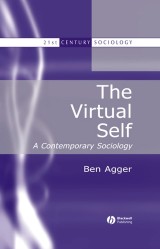Details

The Virtual Self
A Contemporary Sociology21st Century Sociology 1. Aufl.
|
40,99 € |
|
| Verlag: | Wiley-Blackwell |
| Format: | |
| Veröffentl.: | 15.04.2008 |
| ISBN/EAN: | 9780470775172 |
| Sprache: | englisch |
| Anzahl Seiten: | 216 |
DRM-geschütztes eBook, Sie benötigen z.B. Adobe Digital Editions und eine Adobe ID zum Lesen.
Beschreibungen
<i>The Virtual Self</i> is an engaging and exciting text that addresses issues relating to our rapidly changing society, social structure, and communication needs. In doing so, it addresses major issues in sociology that inform virtually all of a student’s course work.<br /> <ul> <li>Introduces students to concepts of the self and society in an age of rapid technology and high speed communication</li> <li>Examines the relationship between everyday life and social structure in key domains of communication, personality, work/family, leisure and entertainment, and economics</li> <li>Written in a lively, engaging style for readers without a sociological background</li> </ul>
Preface. <p>1. Everyday Life in Our Wired World.</p> <p>2. Sociology’s Encyclopedia.</p> <p>3. Does Postmodernism Make You Mad? or, Did You Flunk Statistics?.</p> <p>4. Adventures in Capitalism.</p> <p>5. Girl Talk.</p> <p>6. Virtually, a Sociology!.</p> <p>Glossary.</p> <p>References.</p> <p>Index</p>
"Those interested in knowing more about occupations at an individual or societal level will learn much from this book, which offers a wide and forward-looking sociological perspective." <i>Journal of Occupational Science</i> <br /> <p>"This is a bold, innovative work; a powerful study that attests to the cultural construction of the virtual and ‘real’ self in an often terrifying post-industrial world. Ben Agger is America’s leading sociological theorist in the critical school tradition. Classical and contemporary sociological theory ignored the issues he addresses in this book: namely how the self is embedded in technology. Agger corrects this oversight, and in the process has written a book that belongs on the shelf of all serious students of self, the media, culture, and the organization of everyday life." – <i>Norman K. Denzin, University of Illinois at Urbana-Champaign</i><br /> </p> <p>"<i>The Virtual Self</i> explores the many challenges posed by ‘virtuality’ for ethical, political, and social analysis. Agger mobilizes a wide-ranging style of intertextual criticism that engagingly illustrates why virtual selves and network societies must become a new focus for contemporary social research. His accessible approach and conversational style make this an ideal book for courses in several different disciplines." – <i>Timothy W. Luke, Virginia Polytechnic Institute and State University</i></p>
<b>Ben Agger</b> is Professor of Sociology and Humanities at the University of Texas at Arlington, where he also directs the Center for Theory. He publishes in critical theory and cultural studies. His most recent books include <i>Public Sociology: From Social Facts to Literary Acts</i> (2000) and <i>Postponing the Postmodern: Sociological Practices, Selves and Theories</i> (2002).
<i>The Virtual Self</i> is a concise, critical introduction to social life in an age of rapid technology and high speed communication. It addresses a fundamental question of our time: is contemporary society significantly different from the society that formed the theories and basic concepts of the founders of sociology? <br /> <p><i>The Virtual Self</i> addresses major issues in sociology that inform virtually all of a student’s course work. Of central concern is the relationship between everyday life and social structure in key domains of communication, personality, work/family, leisure and entertainment, and economics. At the same time, the book advances an argument about our stage of civilization, joining dialogue with critical thinkers and theorists who bemoan the loss of community and civic discourse. These perspectives from critical theory and postmodernism are introduced in readable, digestible ways as discussions are linked to standard sociological concerns such as the relationship between self and society.<br /> </p> <p>Written in a lively, accessible style, <i>The Virtual Self</i> presumes no sociological background and cites ample literature for further reference. Students and scholars will find it an engaging and exciting text.</p>
"Those interested in knowing more about occupations at an individual or societal level will learn much from this book, which offers a wide and forward-looking sociological perspective." <i>Journal of Occupational Science</i> <br /> <p>"This is a bold, innovative work; a powerful study that attests to the cultural construction of the virtual and ‘real’ self in an often terrifying post-industrial world. Ben Agger is America’s leading sociological theorist in the critical school tradition. Classical and contemporary sociological theory ignored the issues he addresses in this book: namely how the self is embedded in technology. Agger corrects this oversight, and in the process has written a book that belongs on the shelf of all serious students of self, the media, culture, and the organization of everyday life." – <i>Norman K. Denzin, University of Illinois at Urbana-Champaign</i><br /> </p> <p>"<i>The Virtual Self</i> explores the many challenges posed by ‘virtuality’ for ethical, political, and social analysis. Agger mobilizes a wide-ranging style of intertextual criticism that engagingly illustrates why virtual selves and network societies must become a new focus for contemporary social research. His accessible approach and conversational style make this an ideal book for courses in several different disciplines." – <i>Timothy W. Luke, Virginia Polytechnic Institute and State University</i></p>

















